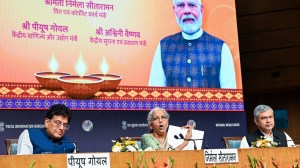Why Friday’s 540-pt fall won’t hurt much
It’s getting increasingly difficult to write definitive stories on markets in a flat world of 24x7 trading activity.

It’s getting increasingly difficult to write definitive stories on markets in a flat world of 24×7 trading activity. Amid fears of a collapse in its housing market — an important, market moving financial indicator — the US market fell yesterday, leading to a contagion fall across the world. India followed too, with the Sensex falling 542 points or 3.4 per cent to close at 15,235.
But even as analysts were rolling their sleeves to buy some bargain basement stocks — Reliance Capital, Tata Steel, Canara Bank and HDFC — the US market got its aspirin in the form of its second quarter GDP numbers that rose to a healthy 3.4 per cent, the highest in the past 12 months.
And now, it seems that aspirin is having its effect on the rest of the world as well. Of the 45 indices in north and South America and Europe, 25 had turned positive, 17 were down marginally and three remained unchanged. But these are moving statistics and by the end of their trading sessions, chances are that most would be out of the red.
Why is America so important for the rest of the world? Because even as its share falls, the country remains the biggest engine of world growth and a fall in its real economy (GDP numbers), means among many other things, that its citizens are consuming less. Which in turn means producer countries like India and China get to sell less. Which finally means lower profits expectations. The end result: a fall in the indices.
At 542 points, this fall is the fifth largest in absolute numbers, after May 18 last year (see table). But what many of us need to realise is that this is not April 1992, when, on a Sensex of 4,467, an almost equivalent fall translated into a 12.8 per cent drop.
This is 2007 and the index is well over 15,000 and the drop is just 3.4 per cent – this sort of a single-day fall is nothing to yawn at but it’s nothing to fear either. An increasingly mature market like India’s should be able to take it in stride.
So on Monday, if global factors are neutralised, expect the market to rise. But whether they will sustain will be decided by YV Reddy, governor, Reserve Bank of India the next day when he announces the first quarter review of annual policy statement 2007-08. If he raises interest rates again, markets may be subdued, if he leaves it unchanged (as experts expect him to) the rise should sustain, and if he lowers them (extremely unlikely for now), markets will zoom.



- 01
- 02
- 03
- 04
- 05




























